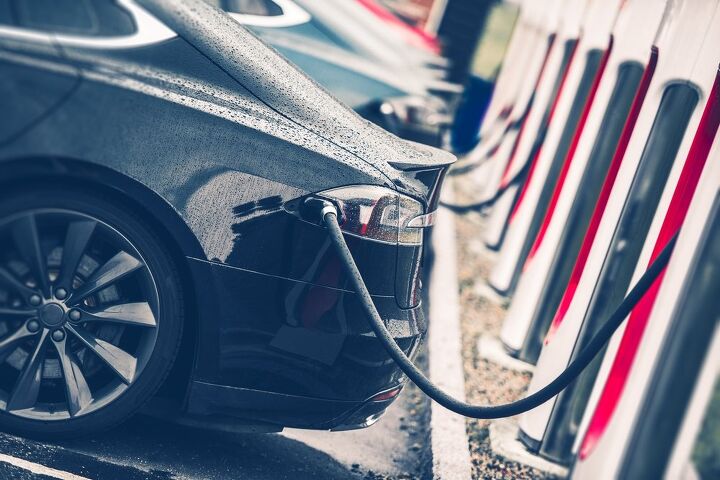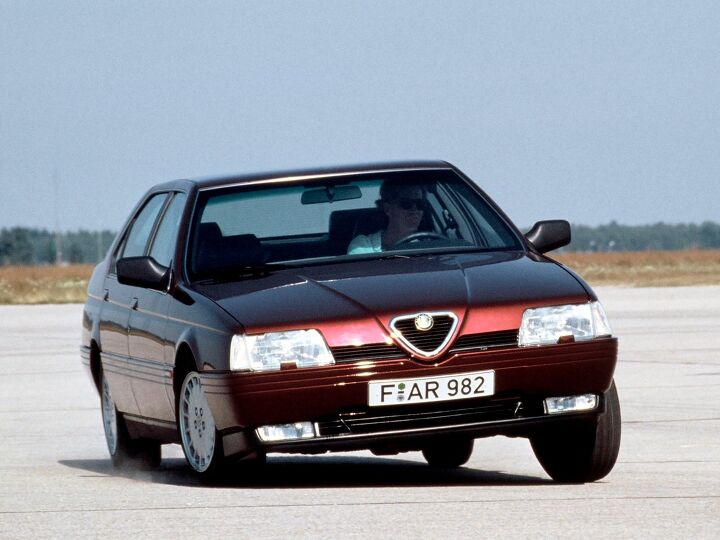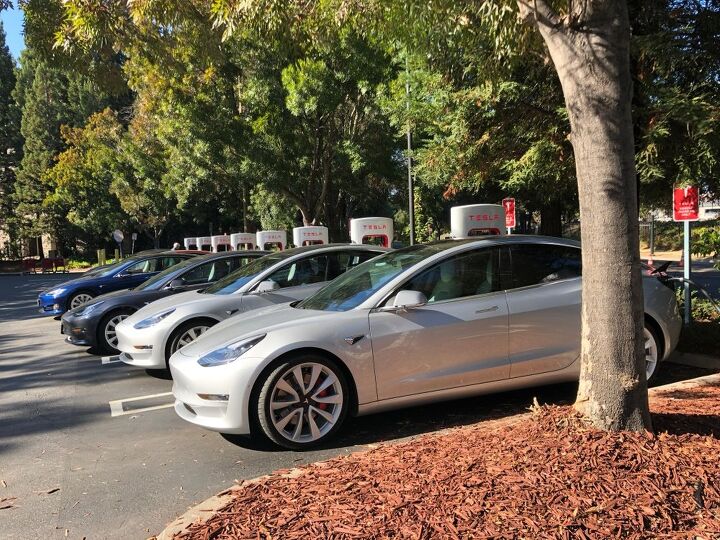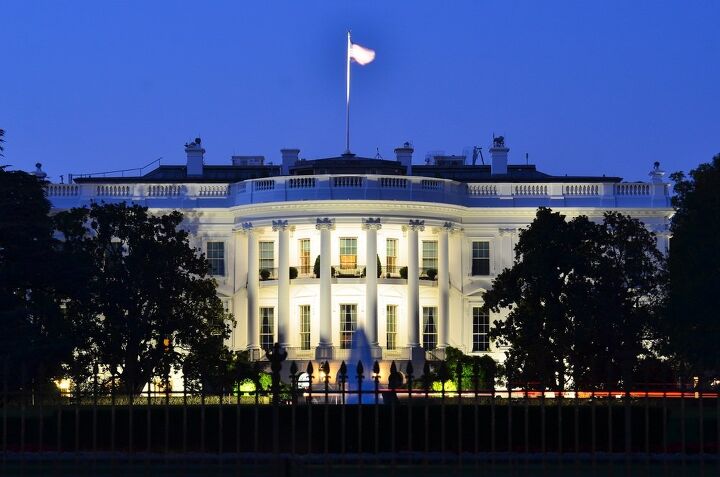#Government
Congress Says Nay to Expanding EV Tax Credits
Prior to Congress taking the rest of the month off to relax and presumably gear up for an impeachment trial, they first had to settle their year-end tax package. Automakers were hoping that would include an extension of electric vehicle tax credits, but it was a doomed proposition.
An extension was initially included in the bipartisan Driving America Forward Act, which manifested this spring, before being incorporated into the Democrat-friendly GREEN Act (Growing Renewable Energy and Efficiency Now). That got it through the House but not the Republican-controlled Senate, which wasn’t interested.
While the current $7,500 EV tax credit remains in place, Tesla and General Motors have both reached their 200,000-vehicle quota. Naturally, they (and other automakers) lobbied for an expansion, one which would have seen a $7,000 credit kept in place until a manufacturer sold 600,000 electric automobiles. Several Republican lawmakers openly shared their distaste for the plan, though few more openly than Senator John Barrasso of Wyoming, who had an opposing bill — called the Fairness for Every Driver Act — interested in reducing subsidies on the grounds that EV credits have already done enough.
House Passes USMCA Trade Deal, Replacing NAFTA
The House of Representatives approved a new North American trade deal on Thursday, causing many to breathe a sigh of relief. The House vote sends the measure to the Senate, with the probable outcome of it being pushed through.
When is another matter, however, as Senate Republican leader Mitch McConnell said the measure would likely be taken up after an impeachment trial. That means we’ll be waiting until 2020. Still, the U.S. Mexico Canada Agreement (USMCA) is one step closer to replacing the North American Free Trade Agreement (NAFTA). Barring a governmental curveball, the automotive industry now knows what to expect.
Amid Emissions Clampdown, Brits Face Reduced Access to 34 MPG Mazda
The roadster news just keeps getting worse for British drivers. As hyper-stringent Euro 6 emission standards come into effect in the new year, drivers in the UK will have a harder time getting their hands on a vehicle we all know and love on this side of the Atlantic.
That vehicle is the Mazda MX-5. Available with a standard 2.0-liter four-cylinder on this side of the pond, Brits can have theirs in two flavors: 1.5-liter and 2.0-liter. Come 2020, the automaker will do its best to dissuade buyers from choosing the larger mill.
With New Factory Coming Online, Tesla Looks to Slash Prices in China
The country’s new car market might be in a state of turmoil, but Tesla’s plans for China haven’t changed. It still wants to capture a big chunk of the country’s “new energy” vehicle market, and the creation of a wholly owned assembly plant, plus a range of local suppliers, makes the company’s goal a near certainty.
As it struggles to ramp up production at its Shanghai facility, Tesla plans to go on a price-slashing spree in 2020, a report claims.
QOTD: Alfa Romeo's Time Come Due?
An article posted yesterday on these renowned pages really got me thinking about how certain brands seem to not have much of a future in the automotive landscape of 2020 — and beyond. If you didn’t click the link there, you may be wondering which brand I’m presently speaking of. It is of course Alfa Romeo.
Let’s do some Italian-style pondering.
A New Twist: California Bans Gov. Purchasing of Most Auto Brands
Just when you thought the gas war couldn’t get any wilder, California has announced it will ban the purchase of any vehicle manufactured by a company that doesn’t explicitly recognize the state’s ability to set its own emission regulations.
Starting in January, California plans to purchase any-and-all government fleet vehicles from only Ford, Honda, BMW, and Volkswagen Group — companies that backed a voluntary agreement to adhere to the state’s emission rules over the summer. The pact is now the subject of a federal antitrust probe.
Any automaker publicly supporting a single national standard (or having recently expressed support for the Trump administration’s fuel rollback proposal) will be deemed ineligible for fleet consideration. “Car makers that have chosen to be on the wrong side of history will be on the losing end of California’s buying power,” California Governor Gavin Newsom said in a statement.
UK City Signs Off on Diesel Ban, Leaving Thousands With Second-class Cars
It’s not just the increased taxation on diesel fuel that’s prompting Europeans to throw in the towel on compression ignition. Look to local lawmakers for Reason Number One why diesel, which just a few years ago comprised the majority of new car sales in the UK, is suddenly less popular than this writer was in high school.
Following similar moves by select German cities and other jurisdictions, the UK city of Bristol has become the first municipality in that country to approve a diesel ban, with fines set to be levelled against anyone caught entering the city with a non-spark engine. Amazingly, this motley crew of second-class vehicles includes transit buses.
States Begin Dealing With Driving Data, Right-to-Repair Laws
In reading this website, you’ve no doubt come across paranoid rants about automotive companies vacuuming up your personal data as connected cars become the norm — often written by yours truly. Frequently bleak, they address a multitude of concerns we believe will only get worse before they can get better.
A large part of that has to do with automakers seeing the potential of leveraging customer data, like so many tech companies have before them. But elected (and unelected) officials also seem to have a loose grasp of the technology and its potential ramifications. When the Department of Transportation initially approved self-driving vehicles for public testing, the guidelines were loose and largely dependent upon self-reporting — few wanted to stand in the way of developing systems that might someday save lives.
However, manufacturers are now beginning to issue over-the-air updates, perpetual internet connectivity, gamification, and in-car marketplaces (complete with advertisements). While the new technology has opened up new doors for customer experiences and corporate revenue, it’s accelerating at a pace that’s difficult to track. As a result, lawmakers in Massachusetts and California are starting to get antsy. The former hopes to address how data will be handled in accordance with the state’s right-to-repair laws. The latter is more directly concerned with privacy.
Trade War Watch: Report Claims White House Wants to Dictate Where Cars Are Manufactured
The Trump administration has reportedly expressed an interest in deciding where and how automotive manufacturers do their business if they want to secure duty-free deals under the United States–Mexico–Canada Agreement (USMCA) that’s positioned to replace NAFTA. According to Bloomberg, there’s currently a discussion taking place between administration officials, congressional staff, and domestic and foreign automakers regarding the context of the legislation that lawmakers will ultimately have to vote on. The White House is said to want highly specific language that would allow it to select production rules unilaterally.
Considering how messy things have gotten with China, it could be useful to have extremely clear trade language and some direct oversight of businesses with global interests. But critics are worried the strategy could bring U.S. trade policy closer to the rigid policies already in place in the People’s Republic — a country America has attempted to distance itself from due to its ludicrous levels of government intervention.
The real fear is that the government could use this to give one manufacturer better treatment than another — cutting it a sweet deal for building in a politically advantageous area, for example. While plausible, we can’t confirm something that’s largely speculative.
Senate Considers $454 Billion Swap to Nationwide Electrification
On Thursday, Senator Chuck Schumer (D-NY) proposed a $454 billion plan aimed at converting the United States from a gasoline-powered nation to one driven primarily by electricity. Under the 10-year plan, automotive consumers would get rebates ranging from $3,000 to over $5,000 (based on efficiency), plus another $2,000 for low-income buyers, for the purchase of electric vehicles made in America.
“This proposal to bring clean cars to all of America will be a key component of the far-reaching climate legislation from Senate Democrats, and I’m proud it has a broad coalition of support,” the senior senator said in a statement.
Much like the haphazard way Schumer insists on wearing glasses at the outermost tip of his nose, begging for gravity to take them, his plan has us mildly concerned.
EPA Chief Hints Vehicle Emission Rules Could Tighten Under Trump - With a Twist
It’s certainly taking this fuel economy rollback proposal we’ve heard so much about a long time to evolve into its final form. Unfortunately, Environmental Protection Agency Administrator Andrew Wheeler has indicated more changes could be needed before a final draft can be released. However, in a bit of a twist, he’s now claiming the proposal will actually be more rigorous than preexisting mandates. Kind of.
“In some of the out years, we’re actually more restrictive on CO2 emissions than the Obama proposal was,” Wheeler told a crowd at the Detroit Economic Club this week.
Chicago Considers Congestion Charges, Starting With Uber/Lyft
Chicago is considering sticking ride-hailing services like Uber and Lyft with a new tax that would add a few bucks onto each ride. Mayor Lori Lightfoot has proposed a $40-million-per-year tax increase as part of a broader traffic plan modeled after London’s famous congestion fines. That means not all rides would be subject to the same fees, but each trip taken within the city would still cost a little extra.
While congestion charges are all the rage in Europe, they’re uncommon in the United States. New York City recently decided to financially penalize every driver taking a trip below 60th Street (something I’m not thrilled about), positioning Chicago as the second major metropolitan area in the U.S. to move forward on congestion fees. Lightfoot claims it’s a necessary first step “to improve mobility and further our goals of ensuring sustainable, affordable and reliable access to transportation options in every neighborhood.”
Gaming the System? Treasury Department Complains of Unworthy EV Credit Recipients
Tax credits are a great way to stimulate purchases or participation, and in the politician’s mind, they often take precedence over affordability measures that would benefit broader swathes of society. That being said, they’re here to say… unless you’re referring to the slowly vanishing federal EV tax credit.
Automakers like Tesla and General Motors are already watching their $7,500 credits halve, then halve again, after surpassing the 200,000-vehicle threshold that starts the countdown to a credit phase-out. Now, the Treasury Department is claiming some recipients of the eco stimulus shouldn’t have received it in the first place.
Gas War: More Backup Arrives for California
California has gained additional support from two Democratic governors in the gas war. On Tuesday, New Mexico Governor Michelle Lujan Grisham announced her state would adopt new tailpipe greenhouse gas and zero-emission vehicle requirements starting in the 2022 model year. The following day, Minnesota Governor Tim Walz directed his state to do the same.
Both of the plans embrace Californian standards already adopted by 13 other states hoping to aggressively curb vehicle emissions and promote the sale of electric cars. It also expresses support for the state after the Trump administration announced it would take for steps to eliminate California’s ability to self-regulate fleetwide greenhouse gas emissions.
“It’s pretty obvious today amongst all chaos in the national news that we can’t count on Washington to lead, so Minnesota needs to,” said Walz.
Feds Want to Give EV Drivers a Choice in What They Hear
What you hear, too. While most electric vehicles emit noises at low speeds to alert pedestrians of their presence, drivers don’t have a say in the sounds emanating from their vehicle. If it came from the factory sounding like a spaceship, that’s something you’ll just have to live with.
Next year is the deadline for full compliance with mandatory low-speed EV noise rules finalized by the National Highway Traffic Safety Administration early last year, but a proposed amendment shows the feds want drivers to dial up a tune.






























Recent Comments